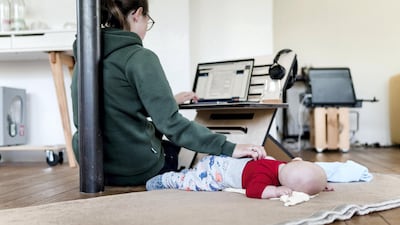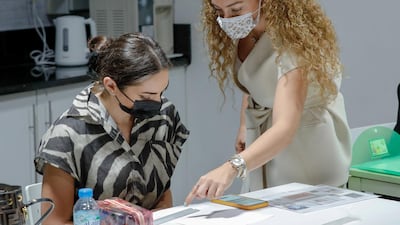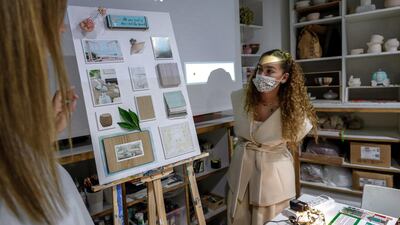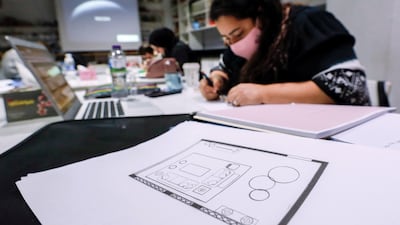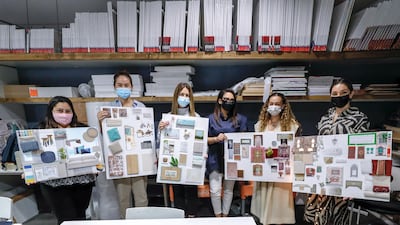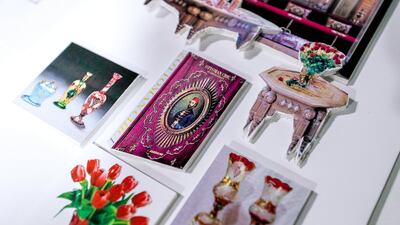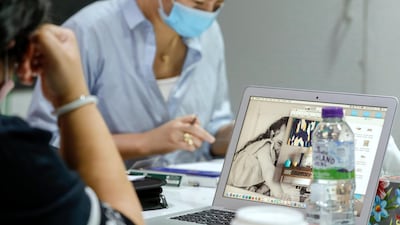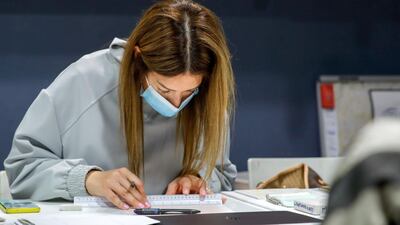Zabeen Mirza is candid about the fact that every time she was pregnant, she had a horrible experience at work. "When I was six months pregnant with my first child, my company sacked me because they didn't want to pay maternity leave," she says. "When I was pregnant with my second, I got sick a lot and couldn't find an employer that allowed me to work flexibly.
“When I had my third child in July 2020, I was given an eight-week maternity leave. When I came back, I was immediately let go,” she says. All three experiences took place in different countries, which to her, sent a powerful message: “The bias against mothers is universal.”
The former Wall Street banker, management consultant and professional negotiator, who lived in the UAE for a time, decided to channel her bad experiences into a good cause, with the launch of Jobs.mom – an online platform that connects mums with supportive employers.
The website launched in the US this month, with contributions from working mothers, advice from experts, a "hire a mom" section, where employers can look for talent and mothers can post their professional profile, and a no-holds-barred podcast. Topics discussed include how to shut down discriminatory questions during interviews, overcoming the gap bias and getting paid what you deserve.

“We are going to have a jobs board where women can share insight and feedback on companies that are doing right by women and those that are not. It’s also about holding companies accountable.”
Jobs.mom has already seen thousands sign up for its newsletter – indicating the demand for such a service. A UAE branch will launch towards the end of Ramadan, and a UK version shortly after that.
Mirza’s aim is simple. “My mission is to get mothers who want to work back to work. We want to connect you to employers who do more than just put up nice slogans saying they believe in women on Mother’s Day. We are showcasing companies that are really practising what they are preaching.”
This includes companies that have returnship programmes for mums, those that offer mental health support, maternity and paternity leave, lactation services and other parent-friendly initiatives.
Getting back to the workplace after childbirth
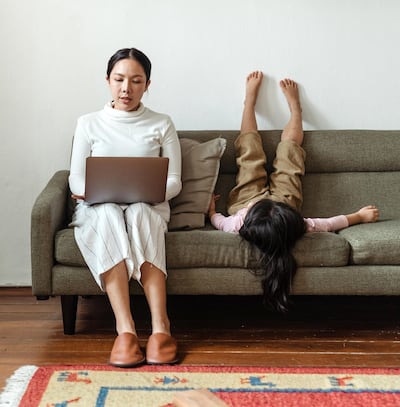
Numerous surveys over the years have indicated that mothers work faster, multitask better and lead with empathy. Despite this, many are forced to choose between their children and their careers, and ultimately end up quitting the latter. The situation has deteriorated owing to the pandemic. According to McKinsey's Women in the Workplace 2020 study, one in three mothers in the US has considered leaving the workforce or downshifting their careers because of Covid-19, with mums more than three times as likely as fathers to be responsible for most of the housework and caregiving, and 1.5 times more likely to spend an additional three or more hours a day on this.
“Thousands of women around the world have been furloughed or lost their jobs because they weren’t able to balance their work with childcare,” says Mirza. “Women have always had to carry that extra workload, but Covid has revealed its extent.”
Louise Karim, managing director of Women@Work, a careers platform in the UAE, points out a silver lining. "The pandemic has made businesses rethink flexible working. I know companies that did not entertain it earlier and now realise that it not only works, but employees are also more productive. Even now, with people increasingly rejoining offices, there are systems in place for them to have hybrid work environments," says Karim.
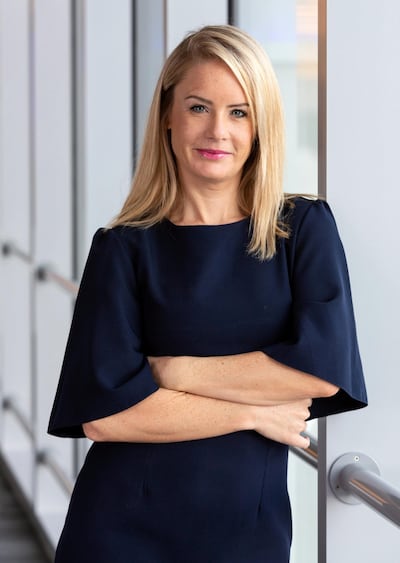
Mirza also hopes that flexible work environments are here to stay. "That being said, human memory is short and we are seeing companies make the push to bring people back. I understand that there's a place and reason for that but, barring certain industries, it's not the right way to go."
Flexible workplaces and returnships
Abier Kadom, manager of culture and engagement for Apco Worldwide’s Dubai office, and a single mother herself, is an advocate for the benefits of flexible workplaces, too. “When you offer employees empathy and grace, they’re going to be more productive, creative and engaged, and this will lead to a greater output and profits.”
The communications consultancy offers benefits such as 60-day maternity leave, a nursing room in the office, hybrid work options, bring-your-children-to-work days and Mother's Day initiatives every year.
"We have an internship programme and, a lot of the time, we hire mothers coming back to the workplace after a break. It's about helping them get those skills and confidence back. I would advise mums to start small and then go back full-time. And I encourage other companies to start something similar; it's a great way to get talent that isn't being tapped into," she says.
Returnships are a similar option. Women@Work, was among the first to launch such programmes in the UAE, by introducing mothers to companies for 12-week-long work periods. “It’s like an internship, but for an experienced hire. And businesses can see right away if you’re a fit for the company,” says Karim.
Women@Work has collaborated with companies such as EY Visa, AXA Insurance and Dubai Business Women's Council as its training partners. It also helps women find work through recruitment services. Since the 2014 launch, Karim says her team have helped more than 1,000 women.
She says returning to work after a break isn't easier in any particular industry. It also depends on how long the break is, with one year being a lot easier than five or more years. For those looking to get back in the game, Karim says: "Make sure you are relevant and up to speed in your industry. Read relevant publications, publish content on social media that will get you seen, and network. If you're having trouble finding an opportunity, offer to do pro bono work, volunteer and build that confidence."
Consider a career shift
However, it cannot be discounted that not all women will be willing or able to get back to the grind after childbirth. For them, Karim recommends freelance or park-time work.
“You have to ask yourself if you can realistically revisit your old career. If it involves a lot of travel or is very demanding, is that what you want?”
Switching careers, while daunting, is another option. Dubai interior designer Anam Clarke says: “My elder sister is intelligent as can be, and used to head an entire floor of people in finance. But after having children, she struggled to find even an entry-level position in her field. And almost all her [mum] friends were having a similar problem. She had to retrain. And that requires you to take a block out of your life – which is easy if you’re young, but not so much if you’re a mother.”
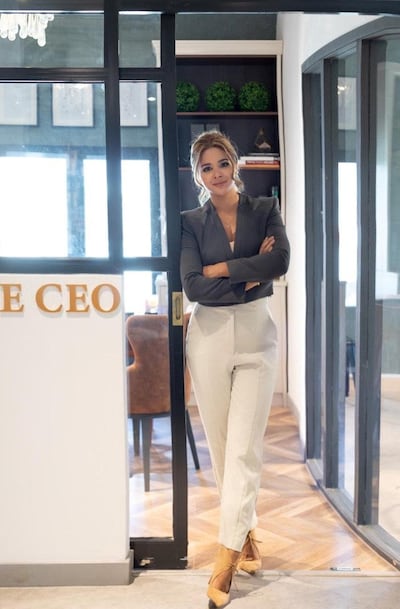
This was the inspiration behind the launch of Clarke’s The Designers’ Studio, which provides career-focused education in interior design, with courses accredited by UK and UAE institutions such as the CPD Certification service and KHDA.
Its certificate courses can be completed in four weeks, with participants attending once a week (on Saturdays or Sundays with convenient timings for mothers and working professionals who have to pick up and drop off schoolchildren) and its diplomas take roughly a year, after completing seven courses. It also helps students to find internships and jobs.
Clarke says 85 per cent of the studio’s students are women, of whom 70 per cent are mothers.
Following its success in Dubai, Clarke started to get queries for a similar course in other emirates, which led The Designers’ Studio to launch beginner’s courses in Abu Dhabi last month.
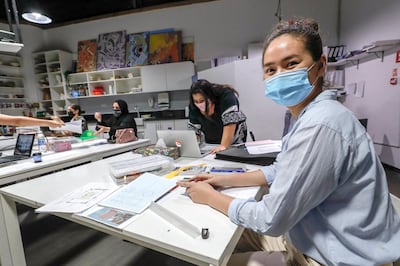
“One of the draws of a career in art and design is that there are so many fields within it, from residential to gardens. Meanwhile, once you get your foot in the door, you can take on smaller projects or take a break between projects.”
Ultimately, Clarke encourages mums to think about what they want long-term.
“Industries are picking up, projects that have been put on the shelf during 2020 are now restarting. The economy is reviving, so it’s a good time to focus on what you want to do for the rest of your life.”
